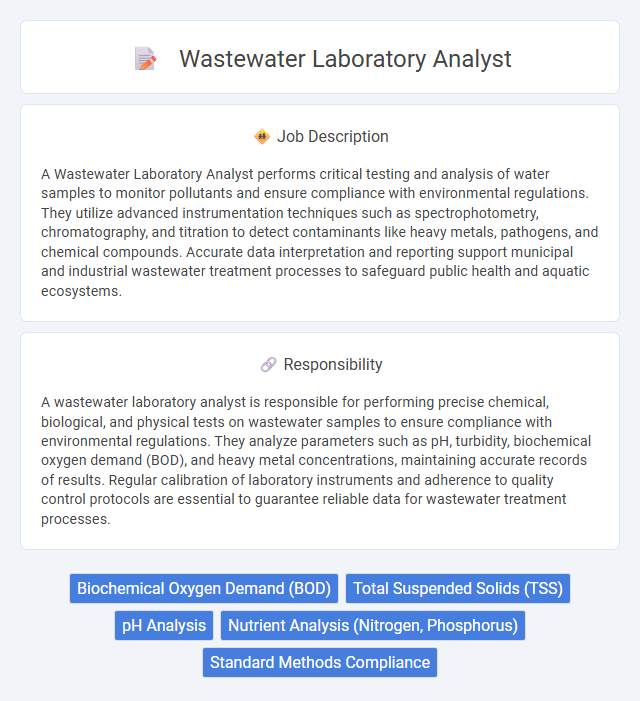
A Wastewater Laboratory Analyst performs critical testing and analysis of water samples to monitor pollutants and ensure compliance with environmental regulations. They utilize advanced instrumentation techniques such as spectrophotometry, chromatography, and titration to detect contaminants like heavy metals, pathogens, and chemical compounds. Accurate data interpretation and reporting support municipal and industrial wastewater treatment processes to safeguard public health and aquatic ecosystems.
Individuals with a strong attention to detail and an interest in environmental science may be well-suited for a wastewater laboratory analyst role, as the job often requires precision in testing and analyzing water samples. Those who are comfortable working in laboratory conditions and can handle routine tasks with consistency might find this position a good fit. People sensitive to chemical exposure or who prefer less technical work may face challenges in adapting to the demands of this occupation.
Qualification
A Wastewater Laboratory Analyst typically requires a bachelor's degree in environmental science, chemistry, microbiology, or a related field, with strong knowledge of water quality testing and analytical techniques. Proficiency in operating laboratory instruments such as spectrophotometers, chromatographs, and microscopes is essential, alongside experience with sample collection and data interpretation following EPA standards. Certification from recognized bodies like the American Water Works Association (AWWA) or state-specific wastewater certifications enhances job prospects and ensures compliance with environmental regulations.
Responsibility
A wastewater laboratory analyst is responsible for performing precise chemical, biological, and physical tests on wastewater samples to ensure compliance with environmental regulations. They analyze parameters such as pH, turbidity, biochemical oxygen demand (BOD), and heavy metal concentrations, maintaining accurate records of results. Regular calibration of laboratory instruments and adherence to quality control protocols are essential to guarantee reliable data for wastewater treatment processes.
Benefit
A wastewater laboratory analyst job likely offers benefits such as gaining specialized expertise in environmental testing and water quality analysis, which can enhance career prospects. There is a probable opportunity to contribute to public health and environmental safety, providing a sense of professional fulfillment. Competitive salaries and possible access to health and retirement benefits might also be part of the job package.
Challenge
Working as a wastewater laboratory analyst likely involves navigating complex challenges related to accurately testing and interpreting water samples under strict regulatory standards. The role may require managing the probability of encountering contaminants at varying concentrations, which demands precise analytical skills and attention to detail. Consistently maintaining data integrity and adapting to evolving environmental regulations are probable ongoing challenges in this position.
Career Advancement
A Wastewater Laboratory Analyst plays a crucial role in monitoring water quality by analyzing samples to ensure compliance with environmental regulations, utilizing advanced instrumentation such as spectrophotometers and chromatographs. Career advancement opportunities include progressing to senior analyst positions, laboratory supervisor roles, or quality assurance management, often requiring additional certifications like Certified Environmental Specialist (CES) or training in data management systems. Expertise in regulatory standards such as EPA guidelines and proficiency in laboratory information management systems (LIMS) significantly enhance prospects for promotion and leadership in environmental laboratories.
Key Terms
Biochemical Oxygen Demand (BOD)
A wastewater laboratory analyst specializing in Biochemical Oxygen Demand (BOD) measures the amount of dissolved oxygen needed by aerobic biological organisms to break down organic material in water samples. Accurate BOD analysis is critical for assessing water pollution levels and ensuring compliance with environmental regulations. This role involves using specialized equipment such as BOD incubators and dissolved oxygen meters to perform tests that inform wastewater treatment efficiency and environmental impact assessments.
Total Suspended Solids (TSS)
A wastewater laboratory analyst specializing in Total Suspended Solids (TSS) conducts precise measurements to evaluate the concentration of suspended particles in wastewater samples. This role requires expertise in filtration, drying, and gravimetric techniques to ensure compliance with environmental regulations and optimize treatment processes. Accurate TSS analysis informs operational decisions that reduce pollutants and improve water quality management in municipal and industrial wastewater systems.
pH Analysis
A Wastewater Laboratory Analyst specializing in pH analysis plays a crucial role in monitoring and controlling the acidity or alkalinity levels in wastewater samples. Accurate pH measurement ensures compliance with environmental regulations and protects aquatic ecosystems from harmful chemical imbalances. Advanced techniques and calibrated pH meters are employed to provide precise data critical for wastewater treatment optimization and regulatory reporting.
Nutrient Analysis (Nitrogen, Phosphorus)
Wastewater laboratory analysts specializing in nutrient analysis focus on accurately measuring concentrations of nitrogen and phosphorus compounds using advanced methods such as spectrophotometry and ion chromatography. Precise nutrient quantification is critical for regulatory compliance, process optimization, and environmental protection by preventing eutrophication in receiving water bodies. Expertise in sample preparation, quality control protocols, and data interpretation ensures reliable reporting aligned with EPA and state environmental standards.
Standard Methods Compliance
A Wastewater Laboratory Analyst ensures accurate analysis of water samples by strictly adhering to Standard Methods for the Examination of Water and Wastewater, maintaining compliance with regulatory requirements such as EPA and NPDES permits. Expertise in performing tests including biochemical oxygen demand (BOD), chemical oxygen demand (COD), and total suspended solids (TSS) under standardized protocols is critical for data integrity and environmental safety. Proficiency in quality control procedures and meticulous record-keeping supports consistent laboratory accreditation and regulatory inspections.
 kuljobs.com
kuljobs.com